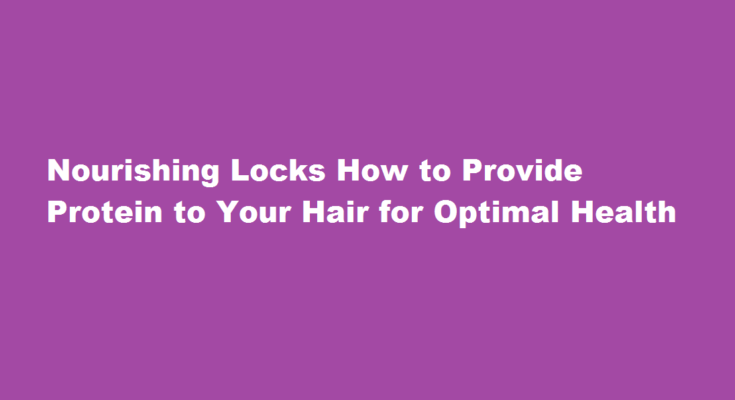Introduction
Having luscious and healthy hair is a desire shared by many, but achieving it requires more than just regular haircuts and using fancy products. Protein plays a crucial role in maintaining the strength, structure, and overall health of your hair. When hair becomes damaged due to external factors such as heat styling, chemical treatments, and environmental stressors, providing protein becomes essential to repair and rejuvenate the hair follicles. In this article, we will explore the significance of protein for hair health and provide unique and informative ways to incorporate protein into your hair care routine.
The Role of Protein in Hair Health
Hair is primarily composed of a protein called keratin. This fibrous protein provides structure and strength to each strand of hair. However, everyday activities like combing, brushing, and exposure to pollutants can cause damage, leading to protein loss from the hair shaft. When hair lacks protein, it becomes weak, brittle, and prone to breakage, split ends, and frizz.
By supplying protein to your hair, you can restore its natural strength and enhance its elasticity, resulting in healthier and more manageable locks. Additionally, protein treatments can also boost hair growth and thickness, adding volume and vitality to your crowning glory.
Ways to Provide Protein to Your Hair
Protein-Rich Diet
Beautiful hair starts from within. Adopting a protein-rich diet is essential for providing the necessary building blocks for hair growth and repair. Incorporate foods like eggs, fish, lean meats, beans, lentils, nuts, and dairy products into your meals. These foods are rich in proteins, amino acids, and essential nutrients that nourish your hair follicles and promote healthy hair growth.
DIY Protein Hair Masks
There are several natural ingredients that can be used to create protein-rich hair masks at home. For instance, mix an egg with yogurt and a teaspoon of honey to create a potent hair mask. Eggs are a rich source of protein and biotin, while yogurt contains lactic acid, which helps cleanse the scalp and remove dead skin cells. Apply this mask once a week, leave it on for 30 minutes, and then rinse thoroughly to give your hair a protein boost.
Use Protein-Enriched Hair Products
Many shampoos, conditioners, and hair treatments are specifically formulated to replenish protein in damaged hair. Look for products that contain keratin, collagen, or silk protein, as these ingredients are known to strengthen and revitalize hair. However, it is crucial to strike a balance with protein usage, as excessive protein can make the hair brittle. Use protein-enriched products every 2-3 weeks, depending on your hair’s needs.
Regular Trimming
To maintain healthy hair, regular trimming is vital. Removing split ends prevents further damage and breakage, helping to preserve the protein content in the hair. Aim to trim your hair every 6-8 weeks to maintain its health and shape.
Cold Water Rinse
After washing your hair with warm water, finish with a cold water rinse. Cold water helps seal the hair cuticles, locking in the moisture and protein from your hair products. This simple step contributes to smoother and shinier hair.
Avoid Overuse of Heat Styling
Excessive heat styling can strip the hair of its natural proteins, leaving it vulnerable to damage. Limit the use of heat styling tools and always apply a heat protectant before using them. Instead, opt for heatless styling methods, such as air-drying or using no-heat curls, to minimize protein loss.
Frequently Asked Questions
Which protein is needed for hair growth?
Biotin is essential for the production of a hair protein called keratin, which is why biotin supplements are often marketed for hair growth. Research has also shown that consuming more biotin can help improve hair growth in people with a biotin deficiency (3).
How much protein is enough for hair?
ANS. A well-rounded diet is an important factor in hair and scalp health. Hair is primarily made up of protein, so be sure to eat at least 45 grams of protein daily.
Conclusion
Protein is the foundation of strong and healthy hair. By incorporating protein-rich foods into your diet and using nourishing hair masks and products, you can restore and maintain the protein balance in your hair, promoting overall hair health. Remember to strike a balance and avoid overloading your hair with protein, as moderation is key. Embrace these tips, and soon you’ll notice your locks transformed into a radiant, lustrous crown of beauty. With proper protein care, you can flaunt your hair with confidence and allure every day.
Read Also : Nurturing Growth Unveiling The Secrets of Nitrogen Nutrition for Plants



